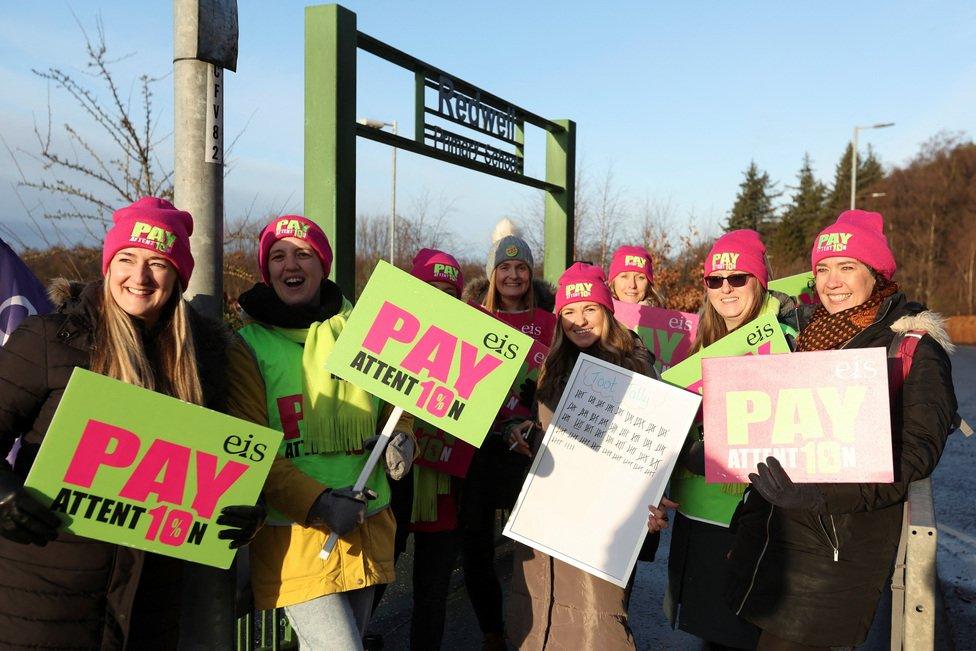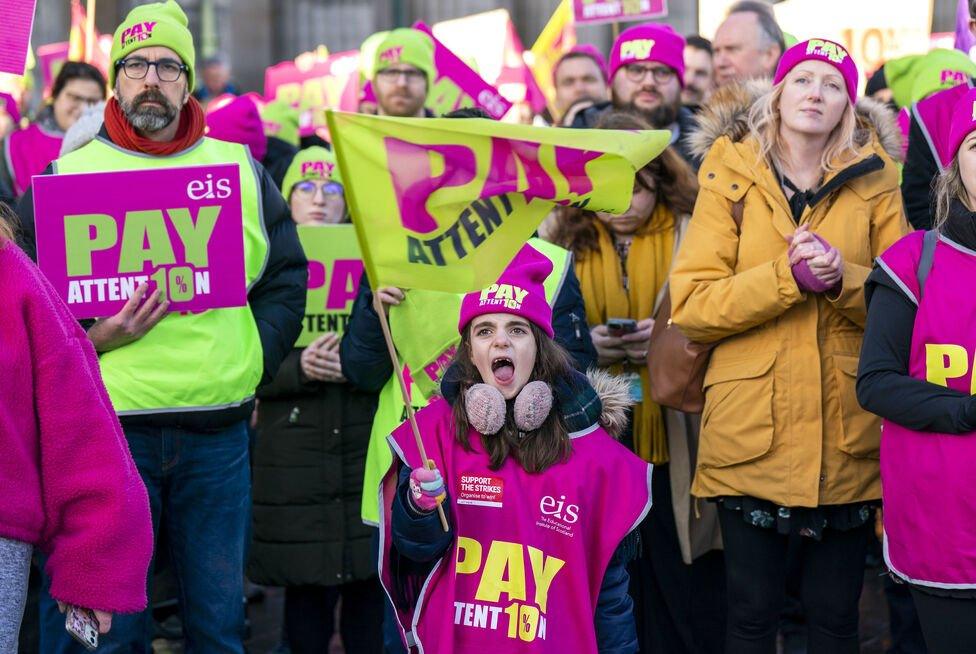Scotland's largest teaching union rejects latest pay offer
- Published

Planned strike action will go ahead after the EIS rejected the deal
Scotland's largest teaching union has rejected the latest pay offer from the Scottish government and councils.
EIS general secretary Andrea Bradley called the proposal "another inadequate offer to Scotland's teachers".
The latest offer includes a 6% pay rise in the current year and a further 5.5% in the new financial year.
Officials from the NASUWT said while the deal was "substantially adrift from a real terms pay award" they would consider it.
Both unions have scheduled strike dates and they will remain in place.
The government said it had found £156m to fund the two-year deal.
However, the EIS said the 6% raise for 2022-23 was insufficient, as inflation is currently at 10.5%.
The EIS, which represents the bulk of unionised teachers, has been demanding a 10% rise this year.
Ms Bradley said: "The 6% offer for this year is only 1% less of a pay cut than that previously offered, twice, by the Scottish government and Cosla."
She added: "The suggested year two component of 5.5% hasn't been negotiated via the appropriate forum, the Scottish Negotiating Committee for Teachers (SNCT), at all.
"Indeed, teaching unions haven't even submitted our pay claim for 2023/24 yet, as a consequence of the current dispute.
"In attempting to tag on next year's pay settlement, without any negotiation at all, the Scottish government and Cosla are attempting to tie the hands not just of teacher trade unions but all public sector unions - and this is unacceptable to the EIS."
She said the EIS was open to further discussions with the Scottish government and the local authority body Cosla to reach a resolution to the dispute.

Teachers are calling for a 10% raise
Education Secretary Shirley-Anne Somerville called the rejection "deeply disappointing".
She said: "It is a fair offer - the fifth that has been made to unions - and would have meant a salary rise of 11.5% for most teachers in April, with a cumulative rise of almost 30% since January 2018.
"We looked for compromise - as we were asked to do - and dug deep under very challenging financial circumstances to arrive at a deal that is affordable and sustainable."
She appealed to the unions to continue discussions with the Scottish government and Cosla and suspend the planned industrial action while talks are ongoing.
Patrick Roach, who is general secretary of NASUWT, said its members remained ready to take strike action on 28 February and 1 March.
He added: ""Whilst we will be carefully considering this revised pay offer, it is substantially adrift from a real terms pay award and does not offer the package of pay restoration that our members would expect.
"We remain committed to securing a negotiated settlement to this dispute, while maintaining our commitment to members to secure a pay deal that fairly recognises and rewards them for the highly skilled and challenging work they do."


It did not take the EIS long to throw out the new pay offer.
They had waited nearly three months for a new offer - the last one was made shortly before the first strike in November.
To say the union was very disappointed would be an understatement.
The issue at stake is the pay rise teachers should have received last April to cover the current financial year.
The unions wanted a 10% rise for that period - instead they were offered 11.5% over two years.
Now industrial action looks set to intensify. Targeted strikes begin next week. Then in a fortnight, most schools are likely to be closed for two consecutive days.
But councils and the Scottish government argue they simply cannot afford a bigger pay offer.
This dispute is deadlocked.

The next national strike is due to be held on 28 February and 1 March.
Before then, the EIS is also planning to target action in a number of areas, including the Dunfermline constituency of Ms Somerville and the Glasgow Southside constituency of First Minister Nicola Sturgeon.
Cosla resources spokesperson Katie Hagmann said: "The decision by the unions to turn down the offer of good faith, without even asking their members, means that teachers will not see a penny of this pay increase in 2022/23.
"Once eventually agreed, any additional pay will be subject to higher tax in 2023/24, meaning less money in the pockets of teachers.
"This was not what council leaders wanted, nor is it in the best interest of our teaching workforce."